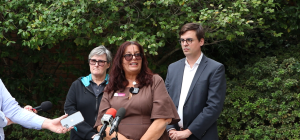The WA Council of Social Service today welcomed the increase to the state minimum wage, but expressed concern that a $16 per week increase is insufficient to arrest growing inequality within Western Australia.
Louise Giolitto, WACOSS CEO, said, “For many, the state minimum wage is simply not enough to meet living costs in WA, particularly singles and single parents.”
“More and more people in our state are struggling to cover basic essentials like their utility bills, with the last year seeing a significant increase in electricity and gas customers seeking assistance, and further significant price hikes already indicated for the coming State Budget.”
“Poverty is a profound social determinant of health and psychological wellbeing. And at the same time, the evidence shows that inequality is a brake on economy growth and sustainability.”
“We know from the latest Anglicare rental survey that singles in Perth are only able to find 1 per cent of available rentals that are appropriate and affordable for them, with single parents looking at just 6 per cent. A minimum wage that is only able to cover rental expenses when you have a second source of income is clearly not adequate.”
WACOSS highlighted the need for the WA Government to overturn changes to community service funding creating a growing gap between the need to deliver wage increases to low-paid community workers and inadequate indexation of service funding.
“Community service funding has only been indexed at 0.83%, compared to the $16 p/w or 2.3% increases under the state wage decision, 3.3% under the federal minimum wage decision and even higher rates increases under the ERO – meaning that some providers may be forced to reduce the quality or level of services delivered to our most vulnerable to keep their doors open,” said Ms. Giolitto.
“The majority of our workforce are women undertaking challenging and skilled work with those in need for comparatively little reward.”
“We are calling on the Premier to re-instate the policy of the previous WA Labor government that saw service funding linked to wages to ensure the sustainability of service for our community,” she concluded.
To download a PDF of this media release, click here.



